
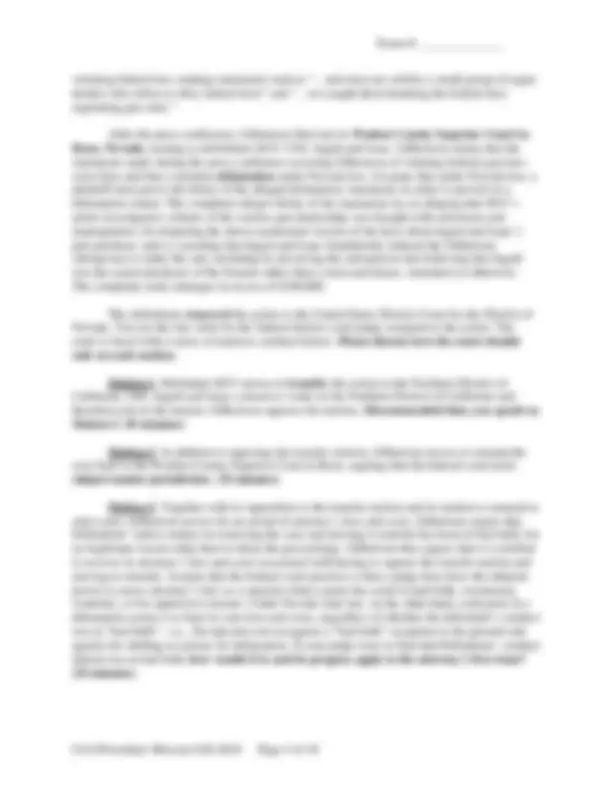
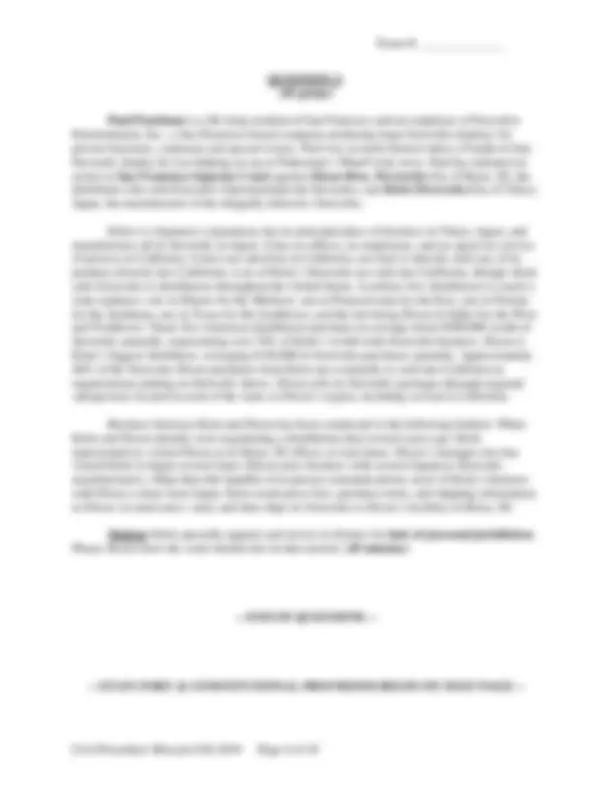
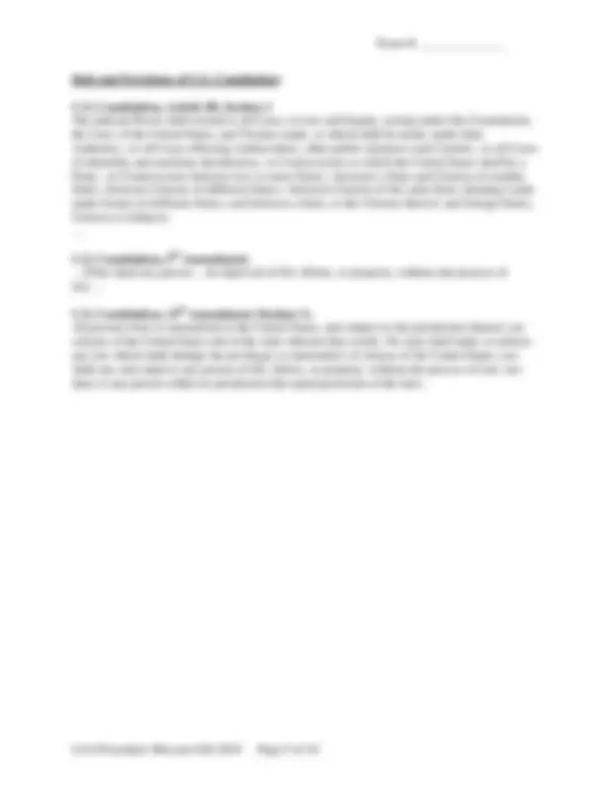
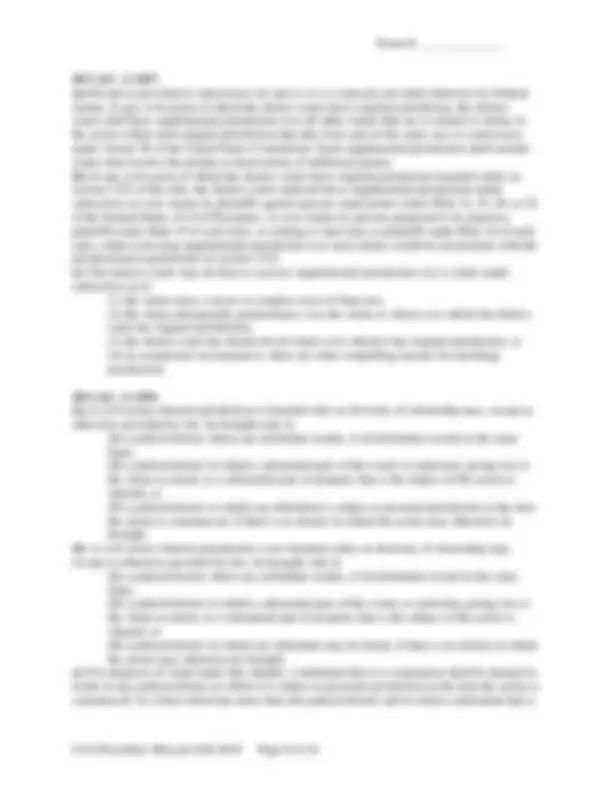
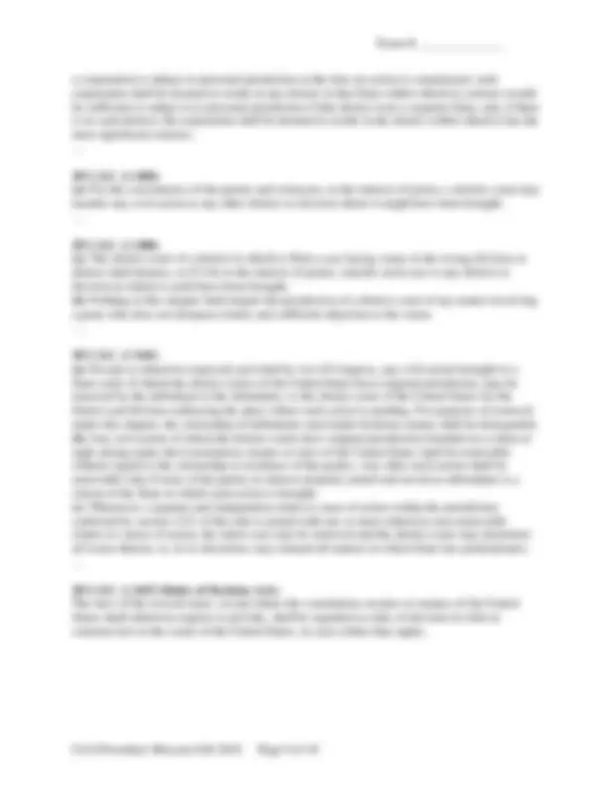



Study with the several resources on Docsity

Earn points by helping other students or get them with a premium plan


Prepare for your exams
Study with the several resources on Docsity

Earn points to download
Earn points by helping other students or get them with a premium plan
Community
Ask the community for help and clear up your study doubts
Discover the best universities in your country according to Docsity users
Free resources
Download our free guides on studying techniques, anxiety management strategies, and thesis advice from Docsity tutors
An analysis of a defamation lawsuit against a gun dealer, gilbertson, by a non-profit organization, stop gun violence (sgv. The lawsuit stems from an investigation of firearms dealers and allegations of federal law violations. The document also discusses the jurisdiction of u.s. District courts, including the federal rules of civil procedure and the u.s. Code. Students studying law, particularly civil procedure and defamation law, will find this document useful for understanding the legal framework of jurisdiction and defamation in the u.s.
Typology: Exams
1 / 10

This page cannot be seen from the preview
Don't miss anything!







Final Exam Civil Procedure I -- Section LS Prof. Moscato Fall 2010
(105 points)
This lawsuit stems from a wide-reaching investigation of firearms dealers conducted by Stop Gun Violence (“SGV”) , a San Francisco-based non-profit organization whose purpose is to promote restrictive gun laws and reduce gun crime. Most of SGV’s work is done through media and public awareness campaigns and legislative advocacy. SGV has field offices in Sacramento, California (Eastern District of California), Phoenix, Arizona (District of Arizona), and Carson City, Nevada (District of Nevada), from which it engages in lobbying activities for those states. Each field office houses three or four lobbyists and a small administrative staff. The San Francisco headquarters houses a staff of eight (including the Executive Director), who coordinate SGV’s media and public awareness activities and handle personnel and other administrative matters.
For one of its projects, SGV conducted an investigation throughout California, Arizona and Nevada focused on the practice of some gun dealers to knowingly permit “straw purchase transactions,” which violates federal law (more on that below). SGV was concerned that a large number of guns purchased in these states in these illegal transactions end up in San Francisco and are used in criminal activities there. “Straw purchase transactions” typically involve the following scenario: An individual who is legally eligible to purchase a firearm (the straw) makes such a purchase, with the intent to immediately transfer the gun to another individual who is legally ineligible to purchase the weapon (the actual purchaser). SGV believed that certain gun dealers knowingly and willingly participated in these illegal transactions.
When purchasing a firearm, a person must fill out federal paperwork, including Bureau of Alcohol, Tobacco, Firearms and Explosives (“AFT”) Form 4473 certifying the purchaser’s legal eligibility to purchase the gun. With respect to straw purchases, one of the questions on Form 4473 is “I am the buyer of this firearm” and the purchaser must answer honestly yes or no, by checking the appropriate box. Straw purchases are a felony violation of the Federal Gun Control Act for both the straw purchaser (who can also be charged with lying on AFT Form 4473) and the ultimate possessor.
As part of its investigation, SGV hired Underco Investigative Group, Inc. (“UIG”) to simulate straw purchases at one of the suspected gun dealerships. UIG is a Nevada corporation with its sole place of business in Reno, Nevada (District of Nevada). UIG assigned two undercover investigators from its Reno field office, Ingrid Iniesta and Isaac Ivey (both life-long residents of the Reno area), to enter Gilbertson Guns & Ammo , a firearms dealership located in Reno, Nevada. Isaac consulted with a Gilbertson salesperson and selected a Glock 9 mm handgun for purchase. Isaac then summoned Ingrid, who had not participated in the selection of the firearm, to join him to complete the purchase. Ingrid filled out the required paperwork, including the AFT forms. Gilbertson ran a background check on Ingrid, and the transaction was completed. The salesperson handed Isaac the gun and he and Ingrid exited the store.
Following their investigation, SGV held a press conference on the steps of the State Capitol in Sacramento to announce their plan to initiate a legal action against numerous gun dealers, including Gilbertson. During the press conference, SGV accused the gun dealers of
(45 points)
Paul Pearlman is a life-long resident of San Francisco and an employee of Executive Entertainment, Inc., a San Francisco-based company producing large fireworks displays for private functions, corporate and special events. Paul was severely burned when a Fourth of July fireworks display he was helping set up at Fisherman’s Wharf went awry. Paul has initiated an action in San Francisco Superior Court against Dixon Bros. Fireworks Co. of Boise, ID, the distributor who sold Executive Entertainment the fireworks, and Kirin Fireworks Co. of Tokyo, Japan, the manufacturer of the allegedly defective fireworks.
Kirin is a Japanese corporation, has its principal place of business in Tokyo, Japan, and manufactures all its fireworks in Japan. It has no offices, no employees, and no agent for service of process in California. It does not advertise in California, nor does it directly send any of its products directly into California. Lots of Kirin’s fireworks are sold into California, though. Kirin sells fireworks to distributors throughout the United States. It utilizes five distributors to reach a wide audience: one in Illinois for the Midwest, one in Pennsylvania for the East, one in Florida for the Southeast, one in Texas for the Southwest, and the last being Dixon in Idaho for the West and Northwest. Those five American distributors purchase on average about $500,000 worth of fireworks annually, representing over 70% of Kirin’s world-wide fireworks business. Dixon is Kirin’s biggest distributor, averaging $150,000 in fireworks purchases annually. Approximately 40% of the fireworks Dixon purchases from Kirin are eventually re-sold into California to organizations putting on fireworks shows. Dixon sells its fireworks packages through regional salespersons located in each of the states in Dixon’s region, including several in California.
Business between Kirin and Dixon has been conducted in the following fashion: When Kirin and Dixon initially were negotiating a distribution deal several years ago, Kirin representatives visited Dixon at its Boise, ID offices several times. Dixon’s manager also has visited Kirin in Japan several times (Dixon does business with several Japanese fireworks manufacturers). Other than this handful of in-person communications, most of Kirin’s business with Dixon is done from Japan. Kirin sends price lists, purchase terms, and shipping information to Dixon via mail and e- mail, and then ships its fireworks to Dixon’s facilities in Boise, ID.
Motion: Kirin specially appears and moves to dismiss for lack of personal jurisdiction. Please discuss how the court should rule on that motion. (45 minutes)
Relevant Provisions of U.S. Constitution:
U.S. Constitution, Article III, Section 2 The judicial Power shall extend to all Cases, in Law and Equity, arising under this Constitution, the Laws of the United States, and Treaties made, or which shall be made, under their Authority;--to all Cases affecting Ambassadors, other public ministers and Consuls;--to all Cases of admiralty and maritime Jurisdiction;--to Controversies to which the United States shall be a Party;--to Controversies between two or more States;--between a State and Citizens of another State;--between Citizens of different States;--between Citizens of the same State claiming Lands under Grants of different States, and between a State, or the Citizens thereof, and foreign States, Citizens or Subjects. …
U.S. Constitution, 5th^ Amendment: …[N]or shall any person ... be deprived of life, liberty, or property, without due process of law….
U.S. Constitution, 14th^ Amendment (Section 1): All persons born or naturalized in the United States, and subject to the jurisdiction thereof, are citizens of the United States and of the state wherein they reside. No state shall make or enforce any law which shall abridge the privileges or immunities of citizens of the United States; nor shall any state deprive any person of life, liberty, or property, without due process of law; nor deny to any person within its jurisdiction the equal protection of the laws.
Relevant provisions of the United States Code:
28 U.S.C. § 1331: The district courts shall have original jurisdiction of all civil actions arising under the Constitution, laws, or treaties of the United States.
28 U.S.C. § 1332: (a) The district courts shall have original jurisdiction of all civil actions where the matter in controversy exceeds the sum or value of $75,000, exclusive of interest and costs, and is between— (1) citizens of different States; (2) citizens of a State and citizens or subjects of a foreign state; (3) citizens of different States and in which citizens or subjects of a foreign state are additional parties; and (4) a foreign state, defined in section 1603 (a) of this title, as plaintiff and citizens of a State or of different States. For the purposes of this section, section 1335, and section 1441, an alien admitted to the United States for permanent residence shall be deemed a citizen of the State in which such alien is domiciled. (b) Except when express provision therefor is otherwise made in a statute of the United States, where the plaintiff who files the case originally in the Federal courts is finally adjudged to be entitled to recover less than the sum or value of $75,000, computed without regard to any setoff or counterclaim to which the defendant may be adjudged to be entitled, and exclusive of interest and costs, the district court may deny costs to the plaintiff and, in addition, may impose costs on the plaintiff. (c) For the purposes of this section and section 1441 of this title— (1) a corporation shall be deemed to be a citizen of any State by which it has been incorporated and of the State where it has its principal place of business, except that in any direct action against the insurer of a policy or contract of liability insurance, whether incorporated or unincorporated, to which action the insured is not joined as a party- defendant, such insurer shall be deemed a citizen of the State of which the insured is a citizen, as well as of any State by which the insurer has been incorporated and of the State where it has its principal place of business; and (2) the legal representative of the estate of a decedent shall be deemed to be a citizen only of the same State as the decedent, and the legal representative of an infant or incompetent shall be deemed to be a citizen only of the same State as the infant or incompetent. …
(a) Except as provided in subsections (b) and (c) or as expressly provided otherwise by Federal statute, in any civil action of which the district courts have original jurisdiction, the district courts shall have supplemental jurisdiction over all other claims that are so related to claims in the action within such original jurisdiction that they form part of the same case or controversy under Article III of the United States Constitution. Such supplemental jurisdiction shall include claims that involve the joinder or intervention of additional parties. (b) In any civil action of which the district courts have original jurisdiction founded solely on section 1332 of this title, the district courts shall not have supplemental jurisdiction under subsection (a) over claims by plaintiffs against persons made parties under Rule 14, 19, 20, or 24 of the Federal Rules of Civil Procedure, or over claims by persons proposed to be joined as plaintiffs under Rule 19 of such rules, or seeking to intervene as plaintiffs under Rule 24 of such rules, when exercising supplemental jurisdiction over such claims would be inconsistent with the jurisdictional requirements of section 1332. (c) The district courts may decline to exercise supplemental jurisdiction over a claim under subsection (a) if - (1) the claim raises a novel or complex issue of State law, (2) the claim substantially predominates over the claim or claims over which the district court has original jurisdiction, (3) the district court has dismissed all claims over which it has original jurisdiction, or (4) in exceptional circumstances, there are other compelling reasons for declining jurisdiction.
28 U.S.C. § 1391: (a) A civil action wherein jurisdiction is founded only on diversity of citizenship may, except as otherwise provided by law, be brought only in (1) a judicial district where any defendant resides, if all defendants reside in the same State, (2) a judicial district in which a substantial part of the events or omissions giving rise to the claim occurred, or a substantial part of property that is the subject of the action is situated, or (3) a judicial district in which any defendant is subject to personal jurisdiction at the time the action is commenced, if there is no district in which the action may otherwise be brought. (b) A civil action wherein jurisdiction is not founded solely on diversity of citizenship may, except as otherwise provided by law, be brought only in (1) a judicial district where any defendant resides, if all defendants reside in the same State, (2) a judicial district in which a substantial part of the events or omissions giving rise to the claim occurred, or a substantial part of property that is the subject of the action is situated, or (3) a judicial district in which any defendant may be found, if there is no district in which the action may otherwise be brought. (c) For purposes of venue under this chapter, a defendant that is a corporation shall be deemed to reside in any judicial district in which it is subject to personal jurisdiction at the time the action is commenced. In a State which has more than one judicial district and in which a defendant that is
Relevant Provisions of the California Code of Civil Procedure:
410. A court of this state may exercise jurisdiction on any basis not inconsistent with the Constitution of this state or of the United States.